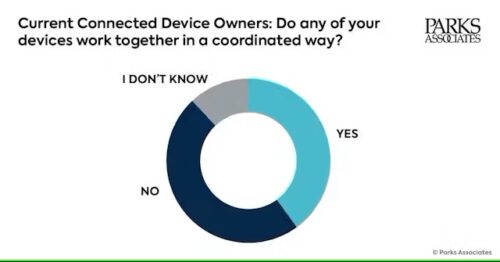
6.9.24 – SIW – Dallas
60% of households with smart devices are using them as point solutions, leaving a large portion of their value unrealized.
Parks Associates’ research reveals 40% of households with connected home devices have at least one multidevice integration or routine established today. This means that 60% of households with smart devices are using them as point solutions, leaving a large portion of their value unrealized.
The firm shared this and other research at its 28th annual CONNECTIONS: The Premier Connected Home Conference, May 7-9
The firm’s Smart Home: Integration, Automation, and Control provides the latest data on smart home trends influencing consumer purchase behavior and preferences. The research notes that word-of-mouth and personal recommendations are crucial drivers for smart home sales, so it is imperative users see the full value of their products so that they can then be product promoters.
“Those owning security systems or an access control device (a smart lock or smart garage door opener) are particularly likely to coordinate smart actions,” said Jason Paris, VP, Business Development, Parks Associates. “Smart access routines also rank among the most appealing, involving integrations of locks, cameras/doorbells, lights, thermostats, and security systems. These routines are designed to enhance household convenience, security, and energy efficiency.”
As part of this project, Parks Associates tested and quantified the appeal of nearly 100 unique routines among all internet households. Today, smart home device owners are largely underutilizing their products — 60% report having no coordination between devices. Much of the value — and vision — of a helpful, intuitive, personal smart home requires coordination among devices, and the dominant method of buying point solutions to solve specific needs isn’t achieving that whole-home promise.
“There is clear consumer demand for integrated and customizable smart home experiences, with a significant emphasis on security, access control, and energy management,” Paris said. “Smart home providers need to balance between offering advanced automation and respecting user preferences for control.”
